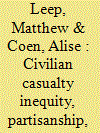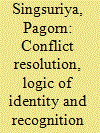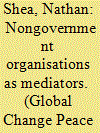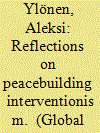|
|
|
Sort Order |
|
|
|
Items / Page
|
|
|
|
|
|
|
| Srl | Item |
| 1 |
ID:
144296


|
|
|
|
|
| Summary/Abstract |
Research into how civilian casualties influence public opinion largely focuses on citizens' support for the use of force by their own countries. This study explores how civilian casualties and partisan cues shape support for the use of force by an ally in a foreign conflict. Specifically, it assesses the effects of civilian casualty inequity – the uneven distribution of civilian casualties across two sides in a conflict – on Americans' support for Israel. Drawing on an original survey experiment conducted during the 2014 Israel–Gaza conflict, the article bridges work on inequity aversion theory, party identification, and social identity theory. It finds that civilian casualty inequity information reduces support for Israel, particularly among Independents. The study also finds that adding explicit partisan criticism cues to civilian casualty inequity information does not appear to induce motivated evaluations of Israel among Republicans or Democrats. An important implication is that under conditions of greater media coverage of civilian casualty inequity, Americans – particularly Independents – might become less supportive of Israel even in the absence of elite criticism of Israel.
|
|
|
|
|
|
|
|
|
|
|
|
|
|
|
|
| 2 |
ID:
144298


|
|
|
|
|
| Summary/Abstract |
This article analyzes various presuppositions behind the principle of absolute openness, which the philosophers of difference hold as the general principle of conflict resolution. Close attention is paid to the issue of identity. To prevent and resolve conflicts, these philosophers propose that others should be recognized by letting them be themselves. In agreement with works on conflict resolution by scholars from other disciplines such as cognitive and social psychology, sociology, anthropology and international relations, these philosophers see the process of identification as critical to understanding antagonism. They analyze this process using the logic of identity, which leads to the principle of absolute openness. It is shown through Paul Ricoeur's philosophy that the presuppositions underlying their understanding of the logic of identity are problematic. Ricoeur's idea of recognition through narrative is then explored and suggestions of how it may help resolve identity conflicts are discussed.
|
|
|
|
|
|
|
|
|
|
|
|
|
|
|
|
| 3 |
ID:
144297


|
|
|
|
|
| Summary/Abstract |
The emergence of international NGOs mediating in intrastate conflicts has been labelled by The Economist as ‘privatizing peace’. This article explores this growth and the tensions brought about by the unofficial standing of NGO mediators. Primary among these is the power differential experienced by weak mediators, whereby they are perceived as unable to deploy the necessary inducements to create conditions favourable for a resolution. This article reviews NGO strengths and weaknesses as mediators by undertaking a case study analysis of the role of the Centre for Humanitarian Dialogue (1999–2003) and the Crisis Management Initiative (2005) in the peace processes in Aceh, Indonesia. It is concluded that despite evident limitations in terms of resources and leverage, within the specific context of the Aceh conflict, the characteristics of the NGO mediators and the mediation strategies adopted by the NGOs allowed them to implement an effective mediation process, and resulted in favourable mediation outcomes.
|
|
|
|
|
|
|
|
|
|
|
|
|
|
|
|
| 4 |
ID:
144299


|
|
|
|
|
| Summary/Abstract |
In 2005 Southern Sudan emerged from a long period of protracted civil war. The Comprehensive Peace Agreement marked the beginning of a period of post-war peacebuilding concentrating on statebuilding. However, since 2005, the much-needed gradual process of building a unified nation and inclusive national identity has been largely neglected. Instead, there has been emphasis on achieving ‘peace-through-statebuilding’ that has contributed to a highly exclusive social, economic, and political order dictated by the leadership of the dominant rebel movement turned government, the Sudan People's Liberation Movement/Army (SPLM/A). This essay reflects on peacebuilding interventionism, and state- and nationbuilding in Southern Sudan since 2005. It argues that this overall process dictated by the SPLM/A leadership, focusing on security and state, excluded the majority of Southern Sudanese from the peace dividend and economic and political opportunities. Further, the exclusive top-down SPLM/A-centric view of the nation marginalized part of the population and contributed to the continuing political instability and armed violence orchestrated by the leading individuals and other military men.
|
|
|
|
|
|
|
|
|
|
|
|
|
|
|
|
| 5 |
ID:
144300


|
|
|
|
|
| Summary/Abstract |
The main objective of this communication article is to analyse why the US–EU partnership has become increasingly important not only to the US and the EU, but also for the world's security and prosperity. As global trends (including globalization, a shift towards the Asia–Pacific region, Western influence currently on the wane, and a multi-polar world in the making) are shaping the geostrategic environment around the US and the EU and posing new threats to global stability, the US–EU partnership has become more necessary than ever. The US and the EU are both economic superpowers and have the most powerful militaries in the world. Their cooperation and coordination are needed to deal with challenges posed by continued poverty in Africa, ongoing violent conflicts in the Middle East, Russia's re-emergence as a world power, and instability in Asia.
|
|
|
|
|
|
|
|
|
|
|
|
|
|
|
|
|
|
|
|
|